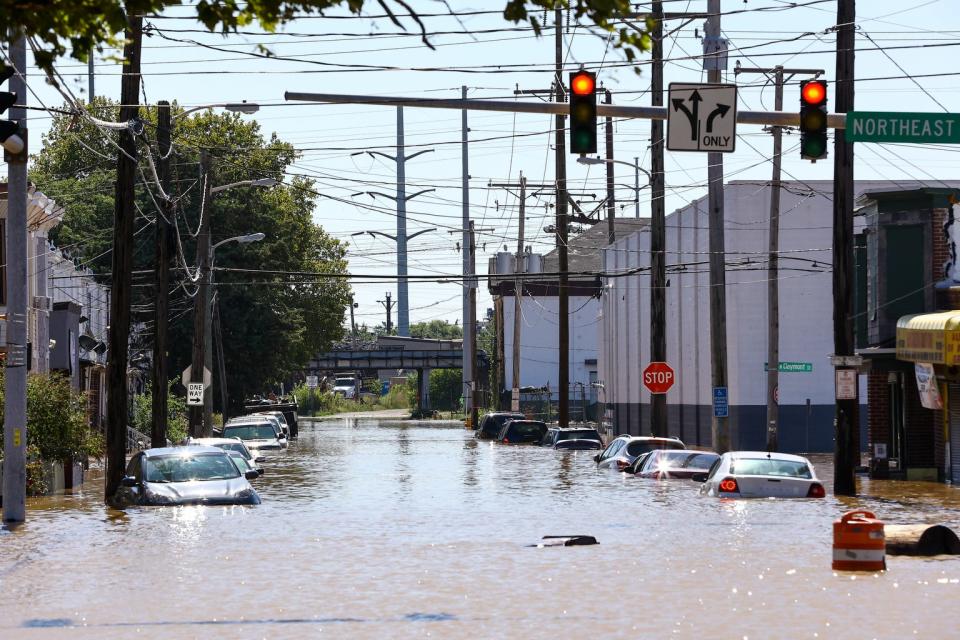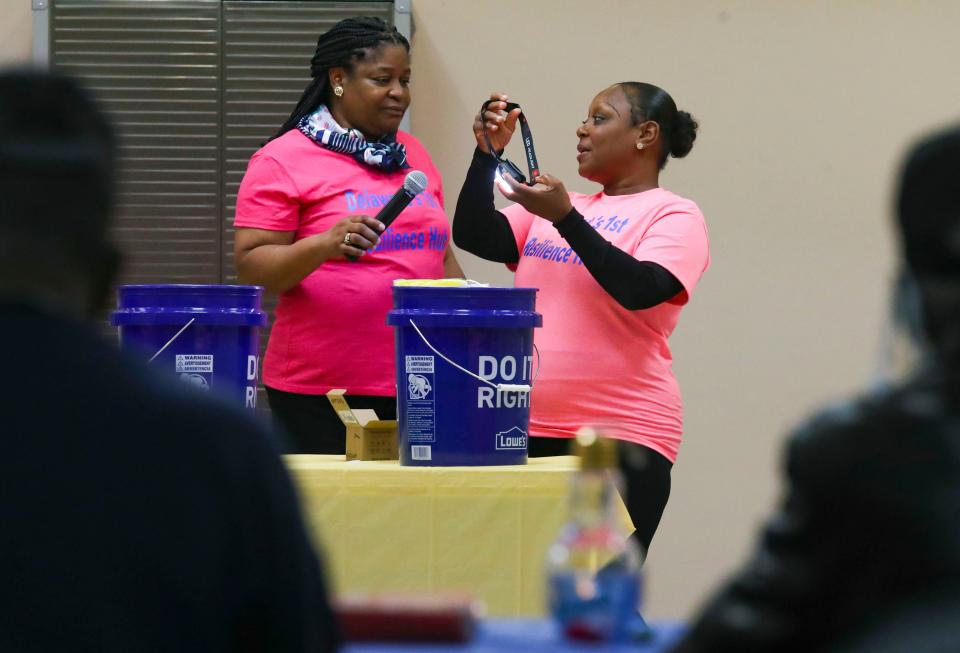Prep kits, alerts: How your family can prepare for environmental disaster in Delaware
The sun was not yet setting Wednesday evening as residents trickled into the Wilmington PAL Center.
The scene couldn't have come together two years ago. Kids, families, local officials and others filled a room fitted for presentations on disaster preparedness and response. Back in September 2021 these residents saw flooding, displacement and panic across their northeast neighborhoods in the wake of Hurricane Ida. This week, they hoped to hear how to keep history from repeating.
The Delaware Resilience Hub — a resource hub focused on community engagement and climate change-fueled disaster readiness launching earlier this year — hosted an Emergency Preparedness Day. The outfit brought a presentation and resources from Wilmington's Office of Emergency Management, DEMA, Red Cross and the Delaware Sea Grant.
"What are the steps that I need to take to make sure me and my family are safe?" Hub organizer Stacey Henry posed ahead of the meeting. "This is what we've been asking for, for two years."
Not all residents' questions were answered in the meeting, but Henry noted monthly trainings and further events will be hosted by the hub. As she put it: "We will make sure the conversation doesn't end here."
Here are some key takeaways on how families can prepare for environmental disaster across Delaware.
How can I sign up for emergency alerts?

The Delaware Emergency Notification System, or DENS for short, is the primary system for public warnings and emergency action information in the First State, according to DEMA. Cities, counties and state agencies can send alerts to Delawareans, once they register.
Speakers also called attention to Smart911.com — a site allowing 911 operators and first responders to know key information about your household in the event of an emergency. The idea is this information could help responders care for your family on any call coming from a number registered with an account.
What should I do in a flood?

Delaware's rate of sea-level rise is about twice the global average.
Flooding is the top environmental hazard in the state, explained Danielle Swallow, a coastal hazards expert with Delaware Sea Grant. Heavy rain and storms offer particular threat, while high tide flooding also continues to increase in prevalence.
Every storm is different, but there are steps to take to be better informed if that day comes.
Understand your risk. Is your home close to a wetland? What elevation is it? If you live within or close to a floodplain, you know you could be in the path of possible flooding and can prepare for it. Regardless, roughly 20% of flood claims to FEMA are outside "high risk" zones, so households also should assess their own vulnerabilities, if they have kids, older adults or anyone more sensitive to possible impacts. Renters and homeowners should consider investing in flood insurance.
Know your evacuation route. Or as DEMA puts it, "Know Your Zone." Evacuation Zones, A to D, encompass low-lying areas, susceptible to flooding and storm surge, according to the agency, and should be understood before the day of disaster. If you're signed up through DENS, you would receive an alert to evacuate. Local coverage may also convey which zones are supposed to evacuate before or during an emergency. If you're sheltering in place, be sure it's not while being alerted to evacuate.
Plan now. As Willie Patrick put it: Winging it is not a good plan. "With our experience from Ida, we have learned so much," said Wilmington's director of emergency management. "Everyone has identified those things that need to be done better, and we're working toward that."
Register for notifications and Smart911, keep information updated, inform your contacts to do the same, Patrick noted. Many Northeast residents in attendance said they didn't receive notifications ahead of Ida remnants' pummeling the neighborhood, but these questions were not addressed directly.
Have a plan for how you will leave and where you will go, following evacuation guidance. Take an emergency supply kit, ideally fit with cash, key numbers or email addresses for family members, copies of important documents and proof of address. "Who are your preparedness buddies?" posed Jeffrey Baggett. Designate an emergency meeting place for reunification.
How do I create my own emergency preparedness kit?

“Grab the bucket while they're grabbing you,” Henry put it simply earlier this summer.
Volunteers encouraged attendees to think of essentials they may need in an emergency that they could place in a sealed bucket or other container until disaster strikes. One of the Delaware Resilience Hub's earliest efforts came in similar packaging, preparing emergency kits for every resident attending its launch or other informational meetings.
For that effort, hub members packed flashlights, first-aid kits, bottled water, wipes, blankets and more into large plastic buckets. Organizers encouraged onlookers to print copies of important personal documents and a list of any needed prescriptions to store inside the kits. Many residents went through the painstaking process of replacing documents like these after Ida.
Your kit should be specific to you and your household, Patrick added. It should cover food necessities, water, medicine and sanitary items for at least three days.
What items could I put in an emergency kit?
Map of the area, places you can go
Cash
Extra keys
NOAA weather radio
First-aid kit
Landline telephone
Battery-powered clock and radio
Flashlights
Batteries, chargers
Chemical light sticks
Whistle
Basic tool kit, some specialized tools, work gloves
Tarp, duck tape
Bleach, assorted cleaners, wet wipes
Towels and rags
Garbage bags
Toilet paper, sanitary supplies
Extra water
Supplies for your pets, including immunization records
What are my important documents to copy?
Family emergency contact list, communication cards
Birth certificates
Marriage certificates
Drivers licenses
Social Security cards
Passports
Wills and deeds
Car registration, insurance documents
Prescription medications
Bank and credit card account numbers
Have a story? Kelly Powers covers race, culture and equity for Delaware Online and USA TODAY Network Northeast, with a focus on education. Contact her at kepowers@gannett.com or (231) 622-2191, and follow her on Twitter @kpowers01.
This article originally appeared on Delaware News Journal: How can your family prepare for environmental disaster in Delaware?

